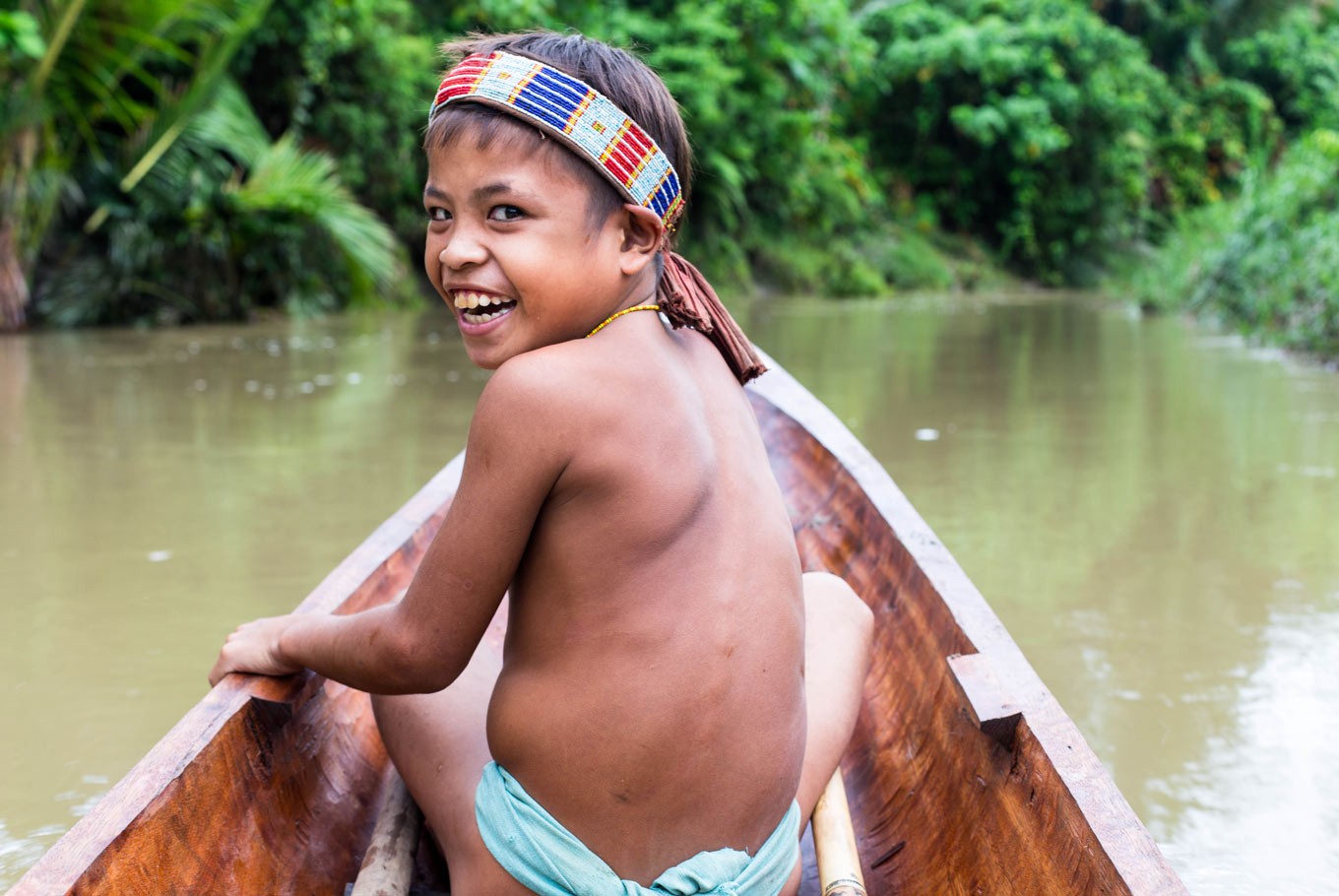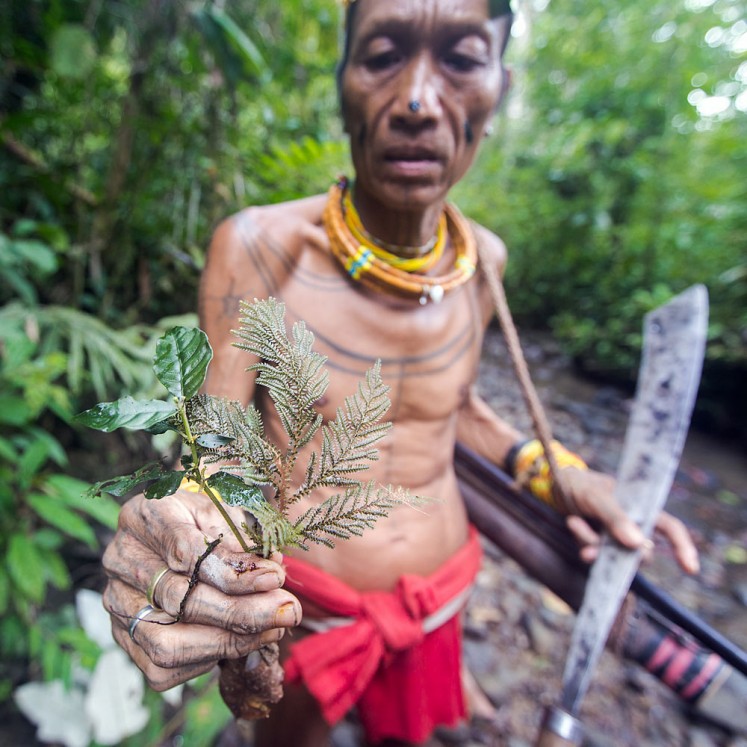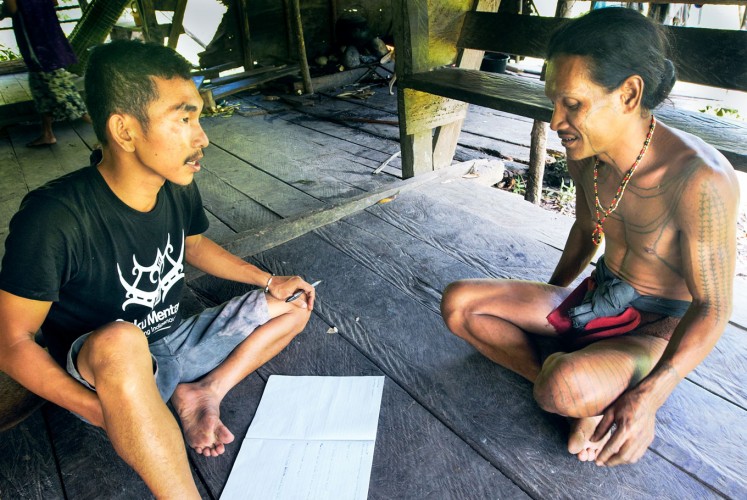Popular Reads
Top Results
Can't find what you're looking for?
View all search resultsPopular Reads
Top Results
Can't find what you're looking for?
View all search resultsBy Mentawai for Mentawai: How community-driven education can save a tribe
“Without us guarding and applying our culture in our daily lives, the Mentawai culture will be lost."
Change text size
Gift Premium Articles
to Anyone
A
ugust Tonggiat Sikatsila sits in the dense jungle of Siberut, the largest island in the Mentawai chain that lies 150 kilometers west of Sumatra.
A recognized biosphere zone with endemic plant and animal species, the forests of the Mentawai Islands are of vital importance to the greater global ecosystem. Tonggiat Sikatsila declares that the living world is central to his people’s heritage, “The forest and its resources are very important in Mentawai culture because it provides us a livelihood and sustainable existence – the forests are the source of all life”.
The indigenous people of the Mentawai Islands are said to have existed there for nearly 4,000 years. One of the last remaining hunter-gatherer groups on Earth, the Mentawai hold extraordinary knowledge of their natural environment, with their subsistent way of life having prospered without interruption for over a hundred generations.
Yet, in a rapidly globalizing world, it was inevitable that the Mentawai would eventually face the threats posed by external interference.
In the 1950s, the government began introducing development programs designed to integrate the Mentawai into mainstream society. While this policy may have sought to encourage social unification, in practice, it resulted in the suppression of the Mentawai’s arat sabulungan – a belief system that links the supernatural powers of ancestral spirits to the ecology of the rainforest. In extreme cases, state policy led to the burning and destruction of cultural paraphernalia used for ritual and ceremonial purposes. Moreover, Mentawai shamans, the sikerei, were forcibly imprisoned or disrobed and removed from the forest.
In the decades to follow, with the introduction of Pancasila and transmigration, the majority of the Mentawai increasingly lost connection with their ancestral ways. The effects of this displacement are enormous. Traditionally, the Mentawai live in family units centered upon a longhouse or uma, which are dispersed throughout the jungle. Government settlements now concentrate multiple families within a single area. Livestock, including pigs, which are the lifeblood and economy of Mentawai society, are banished from these same reserves due to introduced social policy.
As such, the number of Mentawai people still actively practicing cultural customs has been reduced to only 1 percent of the population, isolated to the south of Siberut. However, even this small group is under pressure. The government is constructing a large road to connect inland tribal communities with coastal ports, which were once only accessible by river.
Such development also raises questions about environmental degradation. The rainforests of the Mentawai contain rich timber and, as is the case for the wider archipelago, deforestation is a constant threat. The year 2015 saw 20,000 hectares of forest set aside for oil palm plantation area on Siberut. The power of the local community to make change was seen when local NGOs pressured the Indonesian authorities to cancel the permit, which included Mentawai traditional lands. However, even with this success, the possibility of logging remains a constant presence on the islands.
Mentawai people are also facing a challenge in their day-to-day learning. In the government-sponsored schools, Mentawai children are encouraged to speak Indonesian.
“The migrant teachers do not understand the Mentawai language” Tonggiat Sikatsila explains. “If the teachers can learn to speak our language, then they will be able to teach the children about the value of Mentawai culture too.”
The reality is, without the collective voice of the Mentawai community, their rights and the protection of Siberut’s natural resources will be entirely subject to state control. Tonggiat Sikatsila says that if the Mentawai are moved from their ancestral lands, or the jungle itself is further exploited, then “the Mentawai will fall into great poverty and their lives will be devalued.”
August Tonggiat Sikatsila meeting with Sikerei, Aman Manja to conduct research for their Indigenous education program. (Indigenous Education Foundation/Rob Henry)There is a movement under way to make this a reality.
Beginning in 2009, members of the Mentawai community recognized the need to preserve their traditions as a means of improving their health, well-being and quality of life. As a result, they began seeking change, having surveyed the wider community and discerned that an overwhelming majority wanted to protect and perpetuate their culture.
Rob Henry, an Australian who has lived with the Mentawai for the last decade, says the local community has been at the forefront of this movement. “In 2011 some young Mentawai began campaigning to reconnect with their indigenous culture and land. Over the years I have watched this develop into what is now a well-researched and planned-out strategy to prevent the loss of their precious culture. All they require is a little support to help them get it off the ground”.
The strategy that Henry speaks of centers around community driven indigenous educational programs. They are designed to provide indigenous Mentawai with the opportunity to reconnect with and learn the most important and relevant aspects of their cultural and environmental heritage. The programs, while still being developed and implemented, will run in conjunction with mainstream education and will be taught by the Mentawai for the Mentawai.
There is great optimism among the community that these programs will be a success, however, significant financial investment is needed to ensure they flourish in the years to come.
As Tonggiat Sikatsila muses, staring out at the beauty of the rainforest, “Without us guarding and applying our culture in our daily lives, the Mentawai culture will be lost. This will be devastating for our people and the future of our forest environment […] perhaps even the future of our planet.” (dev/kes)
***
Grace Dungey and Nicholas Rodway are communications officers from the Indigenous Education Foundation. The IEF is running a global campaign to help fund indigenous-run cultural programs in the Mentawai Islands in October. The campaign, entitled “Watch a Film, Save a Culture” (#wafsac), will raise funds through screenings of the award-winning documentary As Worlds Divide, which explores the lives of the Mentawai people in the present day.
---------------
Interested in writing for thejakartapost.com? We are looking for articles and opinions from experts in a variety of fields, as well as others with strong writing skills. Submit your original piece to community@jakpost.com on the following topics: lifestyle (beauty, fashion, food), entertainment, science & technology, health, parenting, social media and sports. Click here for more information.













